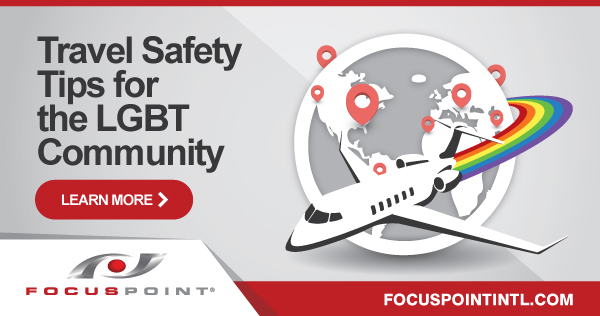Travel Safety Tips for the LGBT Community
The travel market for the LGBT community is growing exponentially. With ample disposable income, this niche market is a dream for the global tourism industry. With the click of a button, you can find LGBT-themed cruises and resorts. Nearly every major travel company and destination now has an LGBT marketing strategy. According to a 2014 community marketing and insights survey that included over 3,500 self-identifying LGBT participants, 82% recorded taking a vacation in the previous 12 months, and 29% said they take five or more trips per year.
However, things are not always easy for those within this community when traveling. The LGBT community faces more hurdles than any other demographics when going to certain locations outside of North America. Many destinations are unfriendly or even oppressive to homosexuality. Seven countries still consider homosexuality punishable with the death penalty, and 70 imprison citizens because of their sexual orientation. Knowing this information is important, as several steps can be taken to make travel safer. As we are an organization that proudly supports and protects LGBT travelers, I thought I would focus this month’s blog on some tips for the gay and trans communities.
Know Before You Go
When it comes to avoiding hostile environments abroad, the key is conducting plenty of research before leaving. Identifying as LGBT is illegal in 37 of Africa’s 54 countries, Saudi Arabia, and other Middle Eastern countries, and parts of Asia, including Indonesia, Singapore, Brunei, and Malaysia. In Jamaica, homosexuality is illegal, and they have had horrific instances of violence towards members of the gay and trans community.
LGBT travelers should also consult resources such as the US State Department website, or CAP membership portal to fully understand the political and security risks of the country before booking a trip.
Here is an example of the LGBT-specific information that can be found in the CAP portal.
Stay Aware of Your Surroundings
While this may seem like common sense, it is important that LGBT travelers understand their surroundings. Stay away from areas and situations which may put you at risk. Avoid overindulging in alcohol. Be mindful of local customs and dress expectations. It is often advisable to blend in with the locals as much as possible. Any traveler that is easily identified as a tourist can put himself or herself at risk.
Avoid discount hotels in international destinations. Some hotels will not accept LGBT travelers. To avoid facing discrimination, check whether each hotel welcomes LGBT travelers before making your reservations. Many international hotel chains and airlines have policies stating their position on the LGBT rights and adhere to these policies globally. Booking one of these hotels can be more expensive, but it gives you piece of mind that you are supporting companies that support you. Some examples of LGBT-friendly chains include Starwood, Marriot, and Hilton.
By planning ahead, LGBT travelers can keep out of potentially dangerous situations. Aside from choosing the right hotel, knowing which neighborhoods, restaurants, and hot spots welcome LGBT visitors is essential.
There Is an App for That
Like most things in life, software developers have built several apps and programs that can make LGBT travel easier. With the click of a button, travelers can find LGBT-specific country information, events, and support organizations. Some notable apps include:
- Vespa – Provides information on LGBT events and parties in over 300 cities in 70 countries
- Misterb&b – LGBT friendly version of Air BNB, all hosts are gay or gay-friendly
- Hornet – Global social networking site for the gay community
The IGLA (International Lesbian, Gay, Bisexual, Trans and Intersex Association) has an interactive map on their website which shows the status of LGBT rights globally. This can help you to plan your travel and make decisions about your choice of destination.
Should you decide to go somewhere that explicitly bans homosexuality, several online dating sites offer advisories for users when they enter a country where homosexual acts are illegal. However, these apps can also be used as evidence in countries where homosexuality is considered illegal.
Pay Attention to Local Customs and Perspectives
Knowing the laws and policies of the area you are visiting is essential. It helps you make informed decisions regarding where you want to travel. This will also provide you with the information to protect yourself from persecution should you go to an area that is not gay-friendly.
There are many questions you will want to ask before traveling to a destination. Should you book hotel rooms with two beds? What is considered acceptable or unacceptable for public displays of affection? In some countries, holding hands between people of the same sex is a regular occurrence, but kissing or other displays of affection between anyone is considered inappropriate and may result in persecution. Does the country have marriage equality? Are there anti-discrimination laws to protect you?
Ultimately our goal is to help make travel safer. We are always available should have any questions about the security of your next planned destination.

